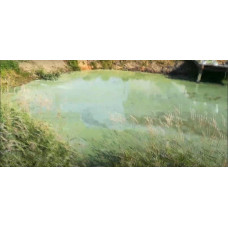From the ancient Greek εὐτροφία, good nutrition.
Eutrophication (eutrophy) is an increase in biological productivity of water bodies as a result of the accumulation of biogenic elements under the influence of anthropogenic or natural factors. Changes in physicochemical and biological parameters of water bodies affect the nature of trophic relationships and the composition of hydrobionts. A distinction is made between natural and anthropogenic eutrophication. Anthropogenic eutrophication caused by human activities (discharge of industrial, agricultural and household effluents, shipping, etc.) deteriorates water quality, making it unsuitable for drinking water supply and fish farming.
The saturation of water bodies with biogenic elements, accompanied by an increase in biological productivity of water basins. Eutrophication can be the result of both natural changes in a water body and anthropogenic impacts. The main chemical elements contributing to eutrophication are phosphorus and nitrogen. In some cases, the term "hypertrophication" is used. Freshwater eutrophic ponds are characterized by rich littoral and sublittoral vegetation and abundant plankton. Unbalanced eutrophication can lead to rapid development of algae (water blooms) and appearance of cyanobacteria in water, which release toxins (alkaloids and low molecular weight peptides) during blooms that can cause poisoning of humans and animals, as well as lead to oxygen deficiency and fish and animal freezing. This process can be explained by an intensive inflow of organic matter during phytoplankton die-off, as well as less light on the bottom of the reservoir and, as a consequence, weakened photosynthesis of bottom plants.
In simplified form, the process of eutrophication has the following basic stages:
1) Concentration of nutrients occurs in the upper water layer, which provokes active development of microflora (first of all, phytoplankton, also algae-foughers) in this zone and increase in mass of zooplankton feeding on phytoplankton. Such growth reduces water transparency, the depth of sunlight penetration decreases, as a result of the lack of light the death of benthic plants begins. The process of dying off of benthic aquatic plants leads to the death of other organisms for which these plants form a habitat or for which they are a higher link in the food chain.
2) Activity of plant (especially algae) biomass increase depends on temperature regime of upper water layer. At night time photosynthesis in these plants does not occur, but the active process of respiration continues. In summer, in the pre-morning hours of warm days, the oxygen content in the upper water horizons decreases and there is a death of aerobic organisms inhabiting these horizons and demanding the oxygen content (so-called "summer freeze").
3) Dead organisms fall to the bottom of the pond and are decomposed by aerobic bacteria. However, bottom vegetation suffering from hypoxia is no longer able to provide oxygen production to the required extent. And if you consider that the total bioproductivity of eutrophic water body increases, the imbalance between oxygen production and consumption in benthic horizons is growing. Increased oxygen deficit leads to death of oxygen-demanding bottom and near-bottom fauna. A similar phenomenon is observed in winter in shallow enclosed reservoirs - the so-called "winter morass".
4) In the bottom ground, deprived of oxygen, there is anaerobic decomposition of dead organisms with the formation of such strong poisons as phenols and hydrogen sulfide, and such a powerful "greenhouse gas" (in its effect in this regard exceeds carbon dioxide by 25 times) as methane. As a result, the process of eutrophication destroys most species of flora and fauna of the reservoir, almost completely destroying or very strongly transforming its ecosystems, and severely worsens the sanitary and hygienic qualities of water, up to its complete unsuitability for bathing and drinking water supply. The reservoir can even become a swamp due to low oxygen levels.
Eutrophication
Tags: eutrophication

